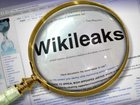South Africa's first all-race vote 25 years ago turned the page on an oppressive system of racial segregation called apartheid that for roughly 50 years privileged whites over blacks.
 Full Story
Full Story
Ukrainians go to polls Sunday, with Volodymyr Zelensky, a 41-year-old comedian turned politician, set to win the leadership of a conflict-riven country seen as a buffer between Russia and the European Union.
 Full Story
Full Story
The Amritsar massacre, 100 years ago this Saturday in which British troops opened fire on thousands of unarmed protestors, remains one of the darkest hours of British colonial rule in India.
 Full Story
Full Story
Using cryptography and virtual drop boxes, Julian Assange's WikiLeaks created a revolutionary new model for media to lure massive digitized leaks from whistleblowers, exposing everything from US military secrets to wealthy tax-dodgers' illicit offshore accounts.
 Full Story
Full Story
The U.S. government has regarded WikiLeaks founder Julian Assange as a dangerous national security threat ever since he and his organization opened a decade-long effort to expose U.S. secrets -- from military files to embarrassing Democratic Party emails during the 2016 election.
 Full Story
Full Story
Protests that erupted in Sudan in December over a hike in bread prices quickly escalated into nationwide demonstrations demanding that President Omar al-Bashir end his 30-year grip on power.
The protests have since Saturday been focused on the military's headquarters in Khartoum where thousands of people have been camped out to call on the army for support.
 Full Story
Full Story
Britons may be forgiven for suffering Brexit fatigue after watching their parliament spend 500 hours debating how to leave the EU without making much headway in nearly three years.
 Full Story
Full Story
Libya has been mired in chaos since the ouster and killing of dictator Moamer Kadhafi in 2011, with two rival authorities and a multitude of militias vying for control of the oil-rich country.
 Full Story
Full Story
Prime Minister Benjamin Netanyahu's long domination of Israeli politics has earned him the nickname "King Bibi" but he now faces the twin risks of a strong political challenger in an April 9 election and possible indictment for corruption.
Should he win again for a fifth term in office, Netanyahu will be on track to surpass Israel's founding father David Ben-Gurion's record of more than 13 years in office.
 Full Story
Full Story
When thousands of people fleeing war and poverty began arriving on their Greek island, many on Lesbos welcomed them. Four years later a sprawling local camp is packed with desperate asylum-seekers and migrants -- and islanders' patience is wearing thin.
 Full Story
Full Story



